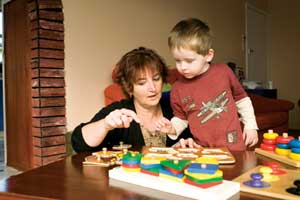Special Education Teacher
Tasks & duties

Special education teachers may do all or some of the following:
-
evaluate and assess students' needs
-
consult with schools, parents, whānau, caregivers, Ministry of Education staff and medical professionals about students' needs
-
plan lessons and activities based on their students' and curriculum needs
-
put into place individual education plans (IEPs) for students
-
adapt teaching methods to meet the needs of students
-
find, provide and adapt resources to meet the special needs of students
-
teach students new skills, and build on existing skills
-
help students to address and cope with their disabilities or difficulties
-
write reports on students
-
help parents and teachers to decide whether a student should be transferred to another school
-
refer students to other support agencies
-
organise timetables for students' support staff
-
help secondary school students in their transition from school to the workplace or further education
Specialisations
Special education teachers may specialise in a particular area such as:
Early Intervention Teacher
Early intervention teachers work with preschool children who have special needs.
Resource Teacher (Learning and Behaviour)
Resource teachers (learning and behaviour) work with primary and secondary students with moderate learning and behaviour difficulties.
Resource Teacher of the Deaf
Teachers of the deaf work with primary and secondary students with hearing impairments.
Resource Teacher (Vision)
Resource teachers (vision) work with primary and secondary students who have visual impairments.
Specialist Teacher
Specialist teachers work with primary and secondary students who have high educational needs because of physical, intellectual or communication impairments.
Skills & knowledge

Special education teachers need to have:
-
teaching skills, and knowledge of different teaching methods and learning styles
-
knowledge of different types of disabilities, such as learning, physical and intellectual
-
knowledge of the curriculum and how to adapt it to suit students' needs
-
skill in evaluating students' progress
-
communication skills, and the ability to relate well to students and adults
-
classroom management skills, including an understanding of behaviour management
-
understanding of child learning and development, including learning difficulties and how to identify them
-
knowledge of school rules and procedures, including safety and emergency procedures
-
knowledge of how to access services that provide support and help to teachers
-
understanding of a range of cultures
-
research skills
-
organisational and problem-solving skills
-
first aid skills
Entry requirements
Special education teacher (primary/secondary)
To become a special education teacher of primary or secondary-aged children in mainstream or special schools, you need to train as a primary or secondary teacher by doing one of the following:
-
a three-year Bachelor of Education (Teaching) or equivalent
-
a degree and a one-year Graduate Diploma of Teaching
-
a combined specialist degree and secondary teaching qualification
Resource and specialist teachers
To become a qualified resource or specialist teacher, you need to be a primary or secondary teacher and complete one of the following graduate qualifications:
-
Resource Teachers (Learning and Behaviour) – Graduate or Postgraduate Diploma in Education (special needs resource teaching).
-
Resource Teacher (Vision) – Graduate Diploma in Special Education with a specialisation in visual impairment.
-
Resource Teacher of the Deaf – Graduate Diploma in Special Education with a specialisation in hearing impairment.
-
Specialist Teacher – Graduate Diploma in Special Education (specialising in students with special educational needs) or Bachelor of Special Education
Early intervention teachers
To become an early intervention teacher working with preschool children, you need an early childhood teacher qualification and a Postgraduate Diploma in Special Education with a specialisation in early intervention.
Special education study awards available for specialist teachers
Study awards provide financial support for teachers who wish to train as specialist early intervention teachers or resource and specialist teachers. Most awards include payment of course fees, a contribution to the school for the teacher's salary while they are studying and a contribution to travel and accommodation.
The number of awards available each year is closely associated with the average number of vacancies in each specialist workforce.
Secondary education
A tertiary entrance qualification is required to become a special education teacher.
Training on the job
Practical teaching experience is gained on the job. Special education teachers can attend courses related to their special education interest area, and may also attend professional development courses.
Registration
First-year teachers must become provisionally registered with the New Zealand Teachers Council and gain full registration after two years of satisfactory work as a teacher. On becoming fully registered you will be issued with a practising certificate, which must be renewed every three years.
Useful experience
Useful experience for special education teachers includes:
-
personal or work experience with people with disabilities or learning difficulties
-
teaching experience
-
counselling, social work or voluntary work with people
-
working with children on a holiday programme
-
childcare work
Related courses
Care for People with Disabilities
General Primary and Secondary Education
Teacher Education: Primary (Pre-Service)
Teacher Education: Secondary (Pre-Service)
Teacher Education: Special Education
Teacher Professional Development
For more information, please refer to Career Services.
Document Actions
